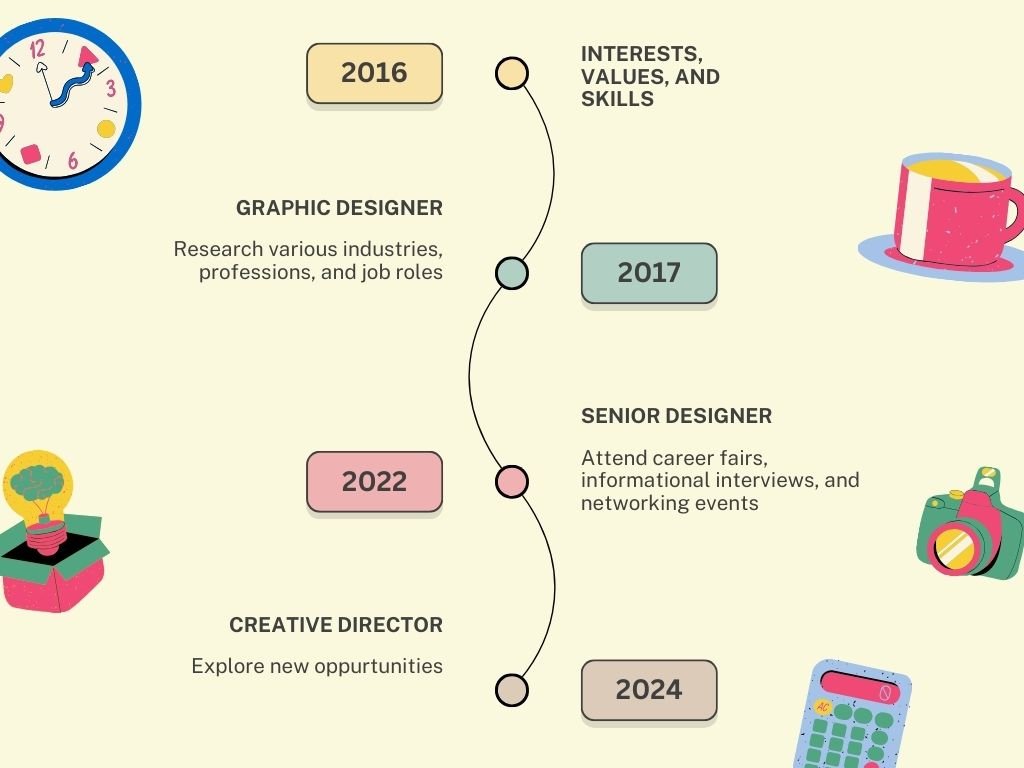Hey beautiful!
Let’s talk about the five essential goals that I believe every student should aim for.
Because school is not just a place to learn math, science, or history, It is a space where you grow, explore, and discover who you are.
In this conversation, we’ll go beyond grades and focus on what real success looks like. You’ll be amazed at how much more you can achieve when you set clear goals and take small, consistent actions. It’s not always easy, but it’s 100% worth it!
Key Goals for Students to Achieve Success
1. Learn Time Management
“Time is precious—waste it wisely.”

If you’re a student juggling classes, homework, extracurricular activities, and maybe even a part-time job, you feel overwhelmed. But with good time management, you can handle everything smoothly.
When you manage your time well, you’ll find that you:
- Feel more in control of your life
- Have time for both work and play
- Accomplish more without burning out
- Reduce anxiety and improve your mental health
A study in the Journal of Educational Psychology found that students who manage their time well, perform better academically. But here’s the kicker – they also reported that they feel happier and more satisfied with their lives overall. That’s definitely a win-win!
Practical Tips and Best Practices
Here are some practical tips and best practices to master time management:
- Prioritize like a pro: Start your day by focusing on your “Big Three” tasks—the most important things you need to get done. Knock these out first, and you’ll feel accomplished and stay motivated all day.
- Set SMART Goals: Make your goals Specific, Measurable, Achievable, Relevant, and Time-bound (SMART).
- Utilize Time Blocks: Plan your day by blocking time for everything, studying, working out, or relaxing. Use a planner or calendar and stick to your schedule to build consistency.
- Try the Pomodoro Technique: Work in 25-minute bursts with a 5-minute break in between. After four rounds, take a longer break. Repeat this cycle to stay focused and avoid burnout.
- Minimize Distractions: Find out what wastes your time the most and cut it out. Create a conducive environment for concentration to maximize your productivity.
- Practice the Two-Minute Rule: If a task takes less than two minutes to complete, do it immediately.
2. Set Personal Development Goals
Let’s talk about personal development – or as I like to call it, “becoming the best version of yourself.”
We all know that school is not only a place where you focus on just getting good grades. But it’s a place where you discover your passion and grow as a person.
Here are some practical tips to get you started:
- Set Clear Goals: Reflect on your passions and aspirations. What kind of person do you want to be? What skills do you want to develop? Set clear, actionable goals that align with your vision for yourself.
- Seek Feedback: Constructive criticism provides valuable insights into your strengths and areas of improvement. Ask colleagues for feedback.
- Practice Self-Care: Take care of your physical well-being. Get enough sleep, eat well, and take time to relax and recharge.
Examples of personal development goals you can set for yourself:
- Practice mindfulness daily (even just 5 minutes can make a huge difference!)
- Read one self-improvement book per month
- Learn a new language or skill
- Develop leadership qualities by taking on more responsibilities in school clubs or community organizations
- Build a strong professional network (LinkedIn is your friend!)
- Establish a regular meditation practice
- Attend workshops or seminars for personal growth
- Limit screen time and prioritize real-life interactions
- Take up a new hobby or creative outlet
- Overcome a fear or challenge (e.g. public speaking)
| Pro Tip: Tune into personal development podcasts hosted by thought leaders and experts in the field. Podcasts like “The Tony Robbins Podcast” offer valuable insights, interviews, and practical advice for personal growth. |
3. Make a Career Plan

When I was in high school, the question “What do you want to be when you grow up?” used to fill me with dread.
If you’re feeling the same way, don’t worry – you’re not alone! Career planning seems overwhelming, but it’s an essential part of preparing for your future.
Why Career Planning Matters
Career planning matters, because:
- You know what you love and what you’re good at.
- Explore all the career options out there.
- You make smart choices about your education and future.
- Set goals and figure out how to get there.
- Be ready to roll with any changes in the job market.
Practical Tips for Effective Career Planning
Now that you understand the importance of career planning, let’s explore some practical steps to help you get started:
Self-Assessment:
Explore your interests, values, and skills. What subjects do you enjoy? What activities make you lose track of time? What issues are you passionate about?
Use tools like:
- Myers-Briggs Type Indicator
- Strong Interest Inventory
Or just journal about these questions and you’ll get valuable insights.
Develop Relevant Skills:
Once you have some career ideas in mind, develop skills that are valuable in those fields. You can take some specific classes, learn a programming language, or work on your writing skills.
Create a LinkedIn Profile:
Even as a high school student, having a professional online presence is very beneficial. Use LinkedIn to connect with professionals, learn about different industries, and showcase your achievements.
4. Develop Emotional Intelligence

Emotional intelligence, simply put, is the ability to understand and manage our emotions effectively.
Now, you might be wondering, “Why should I bother with emotional intelligence?”
Here’s why:
Better Communication:
One of the key reasons why emotional intelligence is so important for success is its impact on communication. Communication is everything. Whether you’re giving a presentation, working on a group project, or just chatting with friends, your ability to express yourself clearly makes all the difference.
Stress Management:
School are stressful. Exams, deadlines, social pressures, it all feels overwhelming. But when you’re able to manage your emotions effectively, you’re better equipped to handle stress and pressure.
Better Decision Making:
Understanding your emotions leads to more thoughtful, balanced decisions. It helps you consider the human element in situations, not just the logical facts. This skill becomes increasingly important as you move into higher education and the workforce.
Tips and Tricks for Developing Emotional Intelligence
So, how can you enhance your emotional intelligence and reap all these amazing benefits? Here are some practical tips and tricks to get you started:
- Self-Awareness: Check in with yourself and identify your emotions everyday. I keep an emotional journal where I write down how I’m feeling and why. It’s amazing how much you learn about yourself through this simple practice.
- Emotion Regulation: When you’re feeling overwhelmed by emotions, it’s important to have strategies to calm yourself down. Deep breathing exercises, mindfulness techniques, or even taking a short walk are very effective. I personally use the “5-4-3-2-1” grounding technique when I’m feeling anxious.
- Cultivate Empathy: Make a conscious effort to see things from other people’s perspectives. Practice active listening and show genuine concern for others’ well-being.
- As the saying goes, “Empathy is seeing with the eyes of another, listening with the ears of another, and feeling with the heart of another.”
- Develop Conflict Resolution Skills: When conflicts arise, approach them with a problem-solving mindset. Look for win-win solutions rather than trying to “win” the argument.
- Practice Assertive Communication: Learn to express your thoughts and feelings in a clear and respectful way. Be honest about your needs while also considering the needs of others.
- Read Books on EQ: There are many great books on emotional intelligence. Some recommendations include “Emotional Intelligence” by Daniel Goleman and “Permission to Feel” by Marc Brackett.
5. Be Financially Independent
Money matters – there’s no way around it. And while it seems like a topic more suited for adults, learning to manage your finances as a student sets you up for success for years to come.
Why Financial Literacy Matters
- Reduced Stress: When you understand how to manage money, you’ll feel more in control and less stressed about financial issues.
- Greater Freedom: Financial independence gives you the freedom to make choices based on your goals and values, not just financial necessity.
- Better Decision-Making: Understanding finances helps you make informed decisions about everything from choosing a college to planning your future career.
- Building Good Habits: The financial habits you develop now will likely stick with you for life. Starting early gives you a big advantage.
- Preparing for the Future: Whether it’s saving for college, planning for a gap year, or just having an emergency fund, financial skills prepare you for what’s ahead.
Tips for Achieving Financial Independence
Here are some strategies for you to get started:
- Create a Budget: Track your income and expenses. Use a spreadsheet or a budgeting app to categorize your spending and see where your money is going. This awareness is the first step to financial control.
- Set Financial Goals: Whether it’s saving for a new laptop, building an emergency fund, or starting to save for college, set clear goals for each area.
- Live Below Your Means: This doesn’t mean you can’t have fun, but find ways to enjoy life without overspending. Look for student discounts, enjoy free campus events, or have potluck dinners with friends instead of eating out.
- Start Saving Early: Even if it’s just a small amount, get into the habit of saving part of any money you receive.
- Understand Credit: If you’re old enough for a credit card, use it responsibly. Pay off the full balance each month to avoid interest charges and build a good credit score.
- Learn About Investing: Even if you do not have much money to invest right now, understand the basics of investing for future financial success. Learn about topics like compound interest, stocks, and index funds.
- Find Ways to Earn: Look for part-time jobs, freelance gigs, or entrepreneurial opportunities that fit around your school schedule. Not only will this provide income, but it’ll also give you valuable work experience.
- Practice Mindful Spending: Before making a purchase, especially a big one, ask yourself if it aligns with your values and goals. Waiting 24 hours before buying something can help you avoid impulse purchases.
Pro Tip: Want to learn more about personal finance? Check out websites like NerdWallet or Khan Academy, and don’t miss Why Didn’t They Teach Me This in School? by Cary Siegel—it’s an easy and fun read!
Conclusion
You’ve just taken an important step toward reaching your full potential as a student. By focusing on these five areas—time management, personal development, career planning, emotional intelligence, and financial independence—you’re setting yourself up for success in school and in life.
As you work on these areas, keep these tips in mind:
- Progress, Not Perfection: You don’t need to master everything. Focus on making small, steady improvements.
- Be Patient with Yourself: Learning new things takes time. Be kind to yourself and celebrate your progress along the way.
- Ask for Help: If you need support, don’t hesitate to ask teachers, mentors, friends, or family.
- Reflect and Adjust: Track your progress and change your goals and plans if needed.








I’m impressed by your aptitude to turn mundane topics into captivating content. Great job!
I really admire your writing skills and your talent to write engaging and interesting posts. Keep up the good work.
I reckon something truly interesting about your site so I saved to favorites.
me encantei com este site. Pra saber mais detalhes acesse nosso site e descubra mais. Todas as informações contidas são conteúdos relevantes e exclusivas. Tudo que você precisa saber está ta lá.
fantástico este conteúdo. Gostei bastante. Aproveitem e vejam este conteúdo. informações, novidades e muito mais. Não deixem de acessar para aprender mais. Obrigado a todos e até mais. 🙂
I would like to thnkx for the efforts you have put in writing this blog. I am hoping the same high-grade blog post from you in the upcoming as well. In fact your creative writing abilities has inspired me to get my own blog now. Really the blogging is spreading its wings quickly. Your write up is a good example of it.
This is a very good tips especially to those new to blogosphere, brief and accurate information… Thanks for sharing this one. A must read article.
Thanks for your whole work on this web site. My mum really likes managing investigation and it’s really easy to see why. A number of us know all relating to the powerful way you present worthwhile strategies by means of your website and even foster response from the others on this subject matter while our own simple princess is undoubtedly understanding so much. Take advantage of the rest of the year. You’re the one conducting a powerful job.
I love looking at and I believe this website got some really useful stuff on it! .
Terrific post however , I was wondering if you could write a litte more on this topic? I’d be very thankful if you could elaborate a little bit further. Bless you!
Hi are using WordPress for your blog platform? I’m new to the blog world but I’m trying to get started and create my own. Do you need any coding expertise to make your own blog? Any help would be greatly appreciated!
There’s noticeably a bundle to know about this. I assume you made certain nice factors in options also.
Your place is valueble for me. Thanks!…
I regard something truly special in this internet site.
It’s actually a nice and useful piece of information. I’m happy that you shared this useful info with us. Please keep us informed like this. Thank you for sharing.
Hi are using WordPress for your blog platform? I’m new to the blog world but I’m trying to get started and create my own. Do you need any coding knowledge to make your own blog? Any help would be greatly appreciated!
Hello there! This is my 1st comment here so I just wanted to give a quick shout out and say I really enjoy reading your blog posts. Can you suggest any other blogs/websites/forums that go over the same subjects? Thanks a ton!
Howdy are using WordPress for your blog platform? I’m new to the blog world but I’m trying to get started and set up my own. Do you require any coding knowledge to make your own blog? Any help would be really appreciated!
Very clear web site, thanks for this post.
There is noticeably a bundle to know about this. I assume you made certain nice points in features also.
That is the proper weblog for anyone who needs to find out about this topic. You understand a lot its nearly arduous to argue with you (not that I truly would want…HaHa). You undoubtedly put a new spin on a subject thats been written about for years. Great stuff, simply nice!